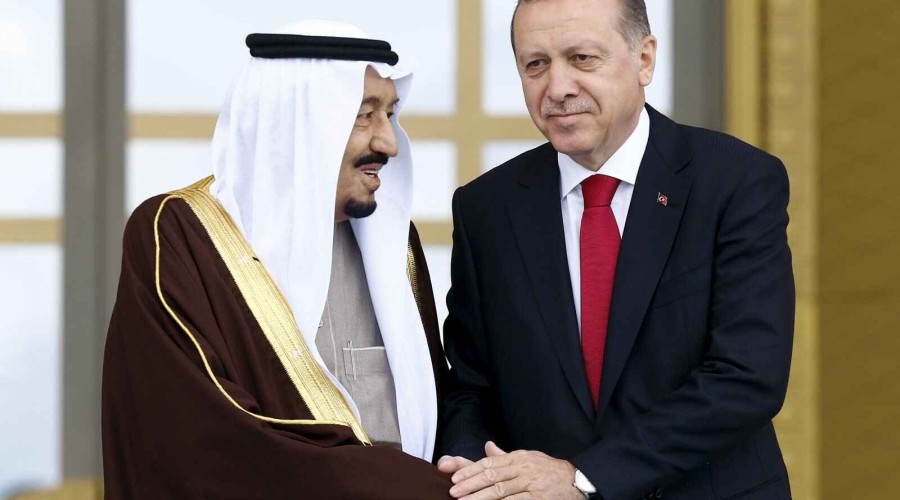Erdoğan visits Saudi Arabia to boost Ankara-Riyadh ties
Erdoğan said he believes increasing cooperation with Riyadh on health, energy, food security, defense industry and finance is mutually beneficial

President Recep Tayyip Erdoğan is visiting Saudi Arabia for a two-day visit on Thursday to discuss ways to enhance ties between Ankara and Riyadh, a statement by the Presidential Communications Directorate said.
Addressing reporters before departing for Saudi Arabia, Erdoğan said his visit is an example of a common will to start a new period with Riyadh.
Turkey will work to start a new era in political, military, economic, and cultural cooperation with Saudi Arabia, he added, Qazet.az reports.
Erdoğan said he believes increasing cooperation with Riyadh on health, energy, food security, defense industry and finance is mutually beneficial.
He expressed hope that the visit will improve ties on basis of mutual respect and trust, saying he will meet Saudi Crown Prince Mohammed bin Salman (MBS).
The president is visiting Jiddah upon the invitation of King Salman of Saudi Arabia.
Relations between Turkey and Saudi Arabia "will be reviewed in all aspects and the possibilities of developing cooperation will be discussed," the statement said.
"During the meetings, views will be exchanged on regional and international issues as well as bilateral relations," it added.
Erdoğan is also expected to travel to Mecca, only a short drive from Jiddah, to perform prayers at Islam’s holiest site in the final nights of Ramadan.
The visit comes as the two regional powers seek to mend nearly a decade of broken ties.
Following the 2011 Arab Spring, ideological differences and rival foreign policy objectives directed Ankara and Riyadh to different directions, making them fierce regional rivals.
Turkey’s support for popular movements linked to the Muslim Brotherhood initially spurred the break with Arab regimes that saw the brotherhood’s political vision as a threat. During the process, Turkey and Saudi Arabia supported opposite sides in many regional conflicts.
Later developments, particularly the blockade of Turkish ally Qatar by its Gulf neighbors, reinforced the split. The lifting of the embargo by Saudi Arabia, the United Arab Emirates (UAE), Egypt and Bahrain early last year paved the way for reconciliation.
Erdoğan last visited Saudi Arabia in July 2017 as he attempted to resolve the blockade on Qatar imposed the previous month.
Turkey sided with its main regional ally Qatar amid the embargo imposed by Saudi Arabia, the UAE and two other Arab states. Turkey has since deepened its military ties with Qatar. The Arab quartet at the time demanded a series of reversals by Qatar, including the expulsion of Turkish troops, but Doha rejected the demands, which it saw as violations of its sovereignty. The dispute was resolved last year with an agreement signed in Saudi Arabia.
While Erdoğan and Saudi Arabia's King Salman maintained their contact during the process, the kingdom’s de facto ruler Crown Prince Mohammed bin Salman (MBS) was seen as the face of Riyadh’s foreign policy and its hostility against Ankara.
Ties between the two countries were further strained after journalist Jamal Khashoggi was killed in the Saudi Consulate in Istanbul in 2018. The murder of 59-year-old Khashoggi, a Saudi insider turned critic who wrote columns for The Washington Post, threw Saudi Arabia into international isolation and escalated Riyadh’s regional rivalry with Ankara.
The killing of Khashoggi in the kingdom’s consulate sparked global outrage and put pressure on the prince, who was said to have approved the operation to kill or capture Khashoggi, in a U.S. intelligence report released a year ago. The Saudi government has always denied any involvement by the prince.
Erdoğan, while not naming the prince, said the order to carry out the assassination came from the “highest levels” of the Saudi government.
A Saudi court jailed eight people over the killing in September 2020 – a trial described as a sham by rights groups – but Turkey also launched a case in absentia against 26 Saudi suspects.
